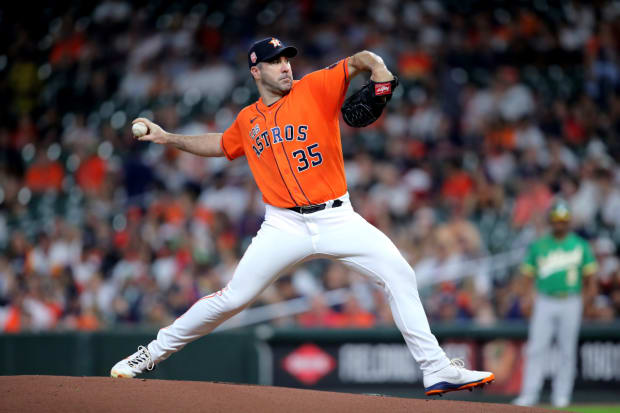The Rangers swooped in to grab Max Scherzer once the right-hander found out Mets owner Steve Cohen no longer was “all in” trying to win the World Series.
Once the Astros heard the Mets were paying $35 million to Texas to accommodate the trade, Houston rushed for its own discounted ace and grabbed Justin Verlander and the $53 million sweetener that came with that deal.
Two aces. Four-hundred-sixty wins. Six Cy Young Awards. Eighty-eight million dollars in subsidies.
One division title up for grabs. And maybe the World Series.
Who got the better pitcher? Let’s break down Scherzer and Verlander and base the answer on only which one will have the bigger impact on this pennant race.
Who is the hotter pitcher?
Scherzer made his Texas debut Thursday night and gave a CliffsNotes version of who he is these days: a feisty competitor with average fastball velocity who may be finding his trusty slider at the right time. He recovered from two wobbly innings against a weak White Sox team to gamely throw 105 pitches—his second-biggest workload of the year—including 20% sliders, his highest rate in his past eight starts. He struck out nine against one of the least disciplined and most grounder-prone offenses in baseball.
It was another step forward. Scherzer already had given up a career-high nine homers on his slider, but in the past two weeks he has tightened the break on what is now a must-have pitch for him.
Verlander takes the ball Friday night against the Yankees. He is 4–1 with a 1.79 ERA in his past seven starts. While his strikeouts and fastball velocity are down, here’s the key to grading his stuff: Hitters are not squaring him up. He has allowed one home run among the 171 batters he has faced in this stretch.
Edge: Verlander
Watch MLB with fuboTV. Start your free trial today.
Who maintains his stuff deep into games better?
Impact starters must do more than “five and fly.” They are not game managers. They need to win games by taking the ball deep.
Scherzer’s last three pitches Thursday were fastballs clocked at 93.8, 94.9 and 94.8 mph. That’s impressive for a 39-year-old who averages 93.6.
What’s more impressive is how Verlander, at age 40, finds an extra gear late in games. Check out his seventh-inning velocity here:
| Verlander | Scherzer |
|---|---|
94.1 |
93.7 |
94.2 |
93.6 |
94.5 |
93.6 |
94.2 |
93.7 |
94.2 |
93.5 |
94.0 |
93.5 |
95.2 |
93.4 |
One more measurement of how they hold their stuff:
| Pitcher | PA | HR | OPS |
|---|---|---|---|
Scherzer |
105 |
10 |
1.019 |
Verlander |
95 |
2 |
.559 |
Edge: Verlander

Erik Williams/USA TODAY Sports
Who has more swing-and-miss stuff?
Teams want swing-and-miss stuff this time of year, especially in October. Here you find a clear edge:
| Pitcher | K/9 | SO% |
|---|---|---|
Scherzer |
10.9 |
27.3% |
Verlander |
7.7 |
21% |
Edge: Scherzer
Who is better in the big moment?
Let’s look at how they do in high-leverage spots:
| Pitcher | PA | Avg. | OBP | SLG | OPS |
|---|---|---|---|---|---|
Scherzer |
64 |
.207 |
.266 |
.414 |
.679 |
Verlander |
55 |
.217 |
.327 |
.348 |
.675 |
Edge: None
Who is better on short rest?
Normal rest now is five days. This time of year and in October you better be ready on four days of rest rather than have your team use a fourth or fifth starter. Over the past two years, neither Scherzer (15 starts, or 36%) nor Verlander (nine starts, or 20%) have pitched much with four days. Let’s see how they’ve fared in those rare starts with less rest:
| Pitcher | GS | W-L | ERA |
|---|---|---|---|
Scherzer |
15 |
8–3 |
3.29 |
Verlander |
9 |
7–0 |
0.93 |
Edge: Verlander
Who is the better postseason pitcher?
Let’s start out answering this with the basic numbers:
| Pitcher | W-L | ERA | G | GS | IP | SO:BB |
|---|---|---|---|---|---|---|
Scherzer |
7–7 |
3.58 |
27 |
22 |
133.1 |
3.22 |
Verlander |
16–11 |
3.64 |
35 |
34 |
162 |
3.38 |
That’s close. Time to dig a bit deeper. Let’s consider their team’s record when they start, their win probability added and their championship WPA:
| Pitcher | TW-L | WPA | cWPA |
|---|---|---|---|
Scherzer |
9–13 |
1.77 |
27.7 |
Verlander |
19–15 |
2.25 |
28.5 |
Edge: Verlander
If you had one game you had to win, which one would you rather start?
We actually have some real-life samples for this question. Let’s see how the two aces have done in postseason games when their team is facing elimination:
| Pitcher | G | GS | IP | W-L | ERA |
|---|---|---|---|---|---|
Scherzer |
12 |
8 |
47.2 |
2–3 |
4.53 |
Verlander |
6 |
6 |
43.1 |
4–2 |
1.87 |
Give Scherzer credit for marching out of the bullpen four times in elimination games. But Verlander’s 1.87 ERA in win-or-go-home games is mighty impressive. Let’s see where it stacks up against all-time big-game greats:
| Pitcher | W-L | ERA |
|---|---|---|
Madison Bumgarner |
2–0 |
0.96 |
Whitey Ford |
2–1 |
1.38 |
Curt Schilling |
4–0 |
1.37 |
Josh Beckett |
3–0 |
1.38 |
Mickey Lolich |
2–0 |
1.67 |
Charlie Morton |
5–1 |
1.69 |
Orel Hershiser |
2–0 |
1.82 |
Justin Verlander |
4–2 |
1.87 |







